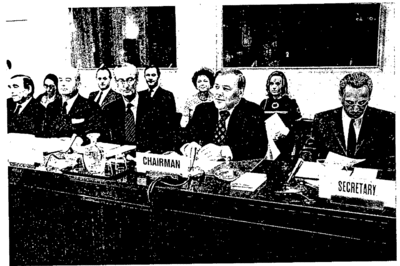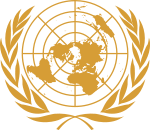- Commission on Narcotic Drugs
-
 At the presiding table, from left to right: Mr. S. P. Sotiroff, Assistant to the Director, U.N. Narcotics Division; Dr. Sten Martens, Director, U.N. Narcotics Division; Mr. Vittorio Winspeare-Guicciardi, Director-General U.N. Office at Geneva; Mr. John E. Ingersoll (United States), Chairman of the Session; and Dr. Istvan Bayer, Secretary.
At the presiding table, from left to right: Mr. S. P. Sotiroff, Assistant to the Director, U.N. Narcotics Division; Dr. Sten Martens, Director, U.N. Narcotics Division; Mr. Vittorio Winspeare-Guicciardi, Director-General U.N. Office at Geneva; Mr. John E. Ingersoll (United States), Chairman of the Session; and Dr. Istvan Bayer, Secretary.
The Commission on Narcotic Drugs is the central drug policy-making body within the United Nations system. Its predecessor, the Advisory Committee on the Traffic in Opium and Other Dangerous Drugs, was established by the first Assembly of the League of Nations on December 15, 1920. The Advisory Committee held its first meeting from May 2 to May 5, 1921, and continued its activities until 1940 [1]. The Commission on Narcotic Drugs was established by the UN Economic and Social Council in 1946, with Canadian Charles Henry Ludovic Sharman as its first chair. The Commission has important functions under the drug control treaties in force today [2]. Most notably, it can amend the Schedules of controlled substances.
Contents
Powers
The drug control treaties divide power between the Commission and the International Narcotics Control Board. The Commission has power to influence drug control policy by advising other bodies and deciding how various substances will be controlled. However, enforcement power is reserved to the Board.
Under Article 8 of the Single Convention on Narcotic Drugs, the Commission's powers are to:
- Amend the Schedules;
- Call the attention of the International Narcotics Control Board to any matters which may be relevant to the functions of the Board;
- Make recommendations for the implementation of the aims and provisions of the Single Convention, including programmes of scientific research and the exchange of information of a scientific or technical nature; and
- Draw the attention of non-parties to decisions and recommendations which it adopts under the Single Convention, with a view to their considering taking action in accordance therewith.
Under Article 17 of the Convention on Psychotropic Substances, the Commission has power to amend the Schedules by a two-thirds vote and "may consider all matters pertaining to the aims of this Convention and to the implementation of its provisions, and may make recommendations relating thereto."
The United Nations General Assembly has power to modify the Commission's decisions, with the exception of scheduling decisions.
Role in drug scheduling
The drug control treaties divide drugs into four Schedules with varying levels of control. Article 3 of the Single Convention and Article 2 of the Convention on Psychotropic Substances set out the scheduling procedure, giving the Commission the power to decide which Schedule a drug or other substance shall be placed into. However, the Economic and Social Council has power to alter or reverse the Commission's scheduling decisions. In addition, each Schedule has certain findings that the World Health Organization must make with regard to a drug or substance before it be placed in that Schedule. The relationship between the WHO and the Commission is described as follows by the Commentary on the Single Convention on Narcotic Drugs [3]:
- The Commission on Narcotic Drugs decides whether a substance is to be placed under international control. It can take a positive decision only in accordance with the recommendation of the World Health Organization. It can include the substance only in that Schedule which is recommended by the Organization. If the World Health Organization recommends Schedule I, the Commission cannot decide to add the substance to Schedule II, or vice versa. The Commission must either accept the Schedule recommended by the World Health Organization or abstain from extending control at all. It may, however, decide to place a drug only in Schedule I and not in Schedule IV if the World Health Organization has recommended simultaneously inclusion in both these Schedules. In no case can the Commission decide to extend control to a substance if the World Health Organization has not recommended to do it.
Article 12 of the United Nations Convention Against Illicit Traffic in Narcotic Drugs and Psychotropic Substances grants the Commission power to decide whether a precursor substance used illicit drug manufacture should be controlled, and if so, which category of controlled precursor substances - Table I or Table II - it should be placed into. The Board's findings on scientific matters in reference to the substance are binding on the Commission, however. And, as with drug scheduling under the other two treaties, the Convention allows the Economic and Social Council to review and overturn the Commission's decisions in reference to precursor substance control.
Membership
The Commission consists of 53 states, serving 4-year terms [4], with the following distribution of seats among regions:
- Eleven for African States;
- Eleven for Asian States;
- Ten for Latin American and Caribbean States;
- Seven for Eastern European States;
- Fourteen for Western European and other States;
- One seat to rotate between the Asian, and the Latin American and Caribbean States every four years.
Council resolutions 845 (XXXII), and 1147 (XLI) provide that members are elected:
- From among the States Members of the United Nations and members of the specialized agencies and the Parties to the Single Convention on Narcotic Drugs, 1961;
- With due regard to the adequate representation of countries that are important producers of opium or coca leaves, of countries that are important in the field of the manufacture of narcotic drugs, and of countries in which drug addiction or the illicit traffic in narcotic drugs constitutes an important problem;
- Taking into account the principle of equitable geographical distribution.
The fact that the Commission is made up of states rather than individuals makes the Commission less independent from political pressures and allows Governments to more directly influence its decisions, in accordance with their own policies and laws. For instance, 21 U.S.C. § 811(d)(2)(B) of the U.S. Controlled Substances Act provides that the recommendations of the Secretary of Health and Human Services in reference to drug scheduling shall be binding on the U.S. representative.
Debates
The CND's annual meeting serves as a forum for nations to debate drug policy. At the 2005 meeting, France, Germany, the Netherlands, Canada, Australia and Iran rallied in opposition to the UN's zero-tolerance approach in international drug policy. Their appeal was vetoed by the United States, while the United Kingdom delegation remained reticent.[1] Meanwhile, U.S. Office of National Drug Control Policy Director John P. Walters clashed with United Nations Office on Drugs and Crime Executive Director Antonio Maria Costa on the issue of needle exchange programs. Walters advocated strict prohibition, while Costa opined, "We must not deny these addicts any genuine opportunities to remain HIV-negative".[2]
The Bulletin on Narcotics has reported on the Commission's activities since 1949.
References
- Bayer, I. and Ghodse, H.: Evolution of International Drug Control, 1945-1995, United Nations Office on Drugs and Crime.
- CND Membership, United Nations Office on Drugs and Crime.
- Commentary on the Single Convention on Narcotic Drugs.
- McLaughlin, Aideen: Drugs expert warns: cannabis as dangerous to society as heroin, 13 March 2005.
- Single Convention on Narcotic Drugs 1961, International Narcotics Control Board.
- Twenty Years of Narcotics Control Under the United Nations, United Nations Office on Drugs and Crime, 1 January 1966.
- U.S. and U.N. drug policy directors butt heads over needle exchanges, Associated Press, 9 March 2005.
External links
Categories:- United Nations Economic and Social Council
- Drug policy organizations
Wikimedia Foundation. 2010.

